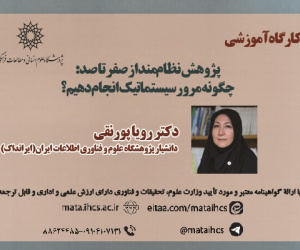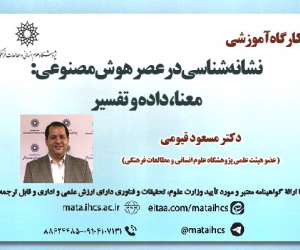ارتباط موسیقی و اسلام از منظر سنت گرایی و نقد آن مبتنی بر قرآن
آرشیو
چکیده
حسین نصر در چند مقاله و سخنرانی پیرامون موسیقی و نسبت آن با اسلام به تبیین این رابطه از منظر سنت گرایی پرداخته است. تحلیل وی از ارتباط دین اسلام و موسیقی بر مبنای ماندگاری موسیقی به معنای عام و هنر موسیقی به معنای خاص آن در جامعه اسلامی است. نصر ابتدا به مبانی نظری که منجر به حرمت موسیقی در نظر متشرعان اسلامی می پردازد و سپس تلاش دارد که مصدایقی را مبتنی بر تایید ضمنی پیشوایان دینی در استفاده از موسیقی در آداب و مناسک دینی و یا غیر دینی ارائه دهد. اهمیت نقش تصوف از نظر نصر در حفظ، بقا و ترویج موسیقی به عنوان بخشی از میراث فرهنگی اسلام کاملا مشهود است. این مقاله تلاش دارد با نقد آرای حسین نصر پیرامون نسبت موسیقی و اسلام مستند بر قرآن به روش کیفی و تحلیلی توصیفی، به نکاتی که از نظر نویسنده مقاله موجب تشکیک می شود پاسخ دهد. اطلاعات و داده های این پژوهش به صورت کتابخانه ای گردآوری شده است.The Relationship Between Music and Islam from the Perspective of Traditionalism And Its Criticism Based on the Qur'an
In several articles and speeches about music and its relationship with Islam, Hossein Nasr explained this relationship from the perspective of traditionalism. His analysis of the relationship between Islam and music is based on the permanence of music in a general sense and the art of music in its specific sense in Islamic society. Nasr first deals with the theoretical foundations that lead to the sanctity of music in the eyes of Islamic jurists and then tries to provide examples based on the tacit approval of religious leaders in the use of music in religious or non-religious customs and rituals. According to Nasr, the importance of the role of Sufism in the preservation, survival and promotion of music as a part of the cultural heritage of Islam is quite evident. This article tries to answer the points that cause doubts in the opinion of the author of the article by criticizing Hossein Nasr's opinions about the relationship between music and Islam based on the Qur'an in a qualitative and descriptive analytical way. The information and data of this research has been collected in a library form.







